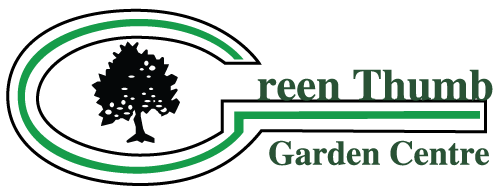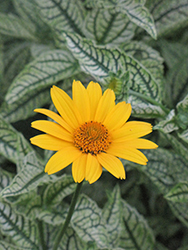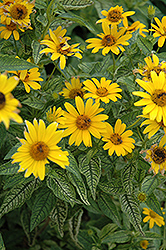Plant Search
Loraine Sunshine False Sunflower
Heliopsis helianthoides 'Loraine Sunshine'
Height: 3 feet
Spacing: 30 inches
Sunlight:
![]()
![]()
Hardiness Zone: 2a
Other Names: Oxeye Daisy, Perennial Sunflower
Brand: Ball
Description:
Sunshine yellow daisy-like flowers sit atop loosely branched plants on this heat tolerant selection; unique white foliage with green veins stand out against other plants in borders and beds; good in containers; lovely addition to cut-flower arrangements
Ornamental Features
Loraine Sunshine False Sunflower has masses of beautiful yellow daisy flowers at the ends of the stems from early summer to mid fall, which are most effective when planted in groupings. The flowers are excellent for cutting. Its attractive serrated oval leaves remain white in colour with distinctive green veins throughout the season.
Landscape Attributes
Loraine Sunshine False Sunflower is an herbaceous perennial with an upright spreading habit of growth. Its medium texture blends into the garden, but can always be balanced by a couple of finer or coarser plants for an effective composition.
This is a relatively low maintenance plant, and is best cleaned up in early spring before it resumes active growth for the season. It is a good choice for attracting butterflies to your yard. It has no significant negative characteristics.
Loraine Sunshine False Sunflower is recommended for the following landscape applications;
- Mass Planting
- Border Edging
- General Garden Use
- Naturalizing And Woodland Gardens
- Container Planting
Planting & Growing
Loraine Sunshine False Sunflower will grow to be about 32 inches tall at maturity, with a spread of 3 feet. When grown in masses or used as a bedding plant, individual plants should be spaced approximately 30 inches apart. It tends to be leggy, with a typical clearance of 1 foot from the ground, and should be underplanted with lower-growing perennials. The flower stalks can be weak and so it may require staking in exposed sites or excessively rich soils. It grows at a fast rate, and under ideal conditions can be expected to live for approximately 10 years. As an herbaceous perennial, this plant will usually die back to the crown each winter, and will regrow from the base each spring. Be careful not to disturb the crown in late winter when it may not be readily seen!
This plant does best in full sun to partial shade. It is very adaptable to both dry and moist locations, and should do just fine under typical garden conditions. It is not particular as to soil type or pH. It is highly tolerant of urban pollution and will even thrive in inner city environments. This is a selection of a native North American species. It can be propagated by division; however, as a cultivated variety, be aware that it may be subject to certain restrictions or prohibitions on propagation.
Loraine Sunshine False Sunflower is a fine choice for the garden, but it is also a good selection for planting in outdoor pots and containers. With its upright habit of growth, it is best suited for use as a 'thriller' in the 'spiller-thriller-filler' container combination; plant it near the center of the pot, surrounded by smaller plants and those that spill over the edges. It is even sizeable enough that it can be grown alone in a suitable container. Note that when growing plants in outdoor containers and baskets, they may require more frequent waterings than they would in the yard or garden. Be aware that in our climate, most plants cannot be expected to survive the winter if left in containers outdoors, and this plant is no exception. Contact our experts for more information on how to protect it over the winter months.









